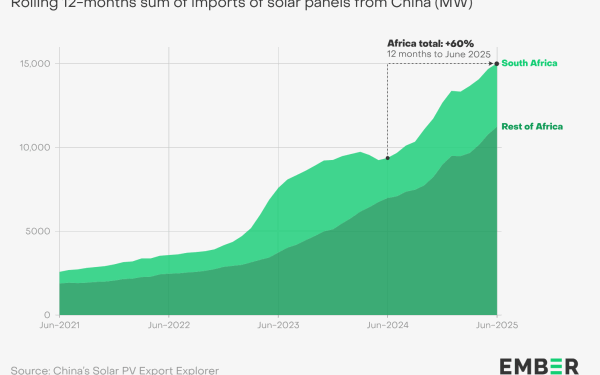
Share on FacebookShare on TwitterShare via Whatsapp
Africa is entering a historic era in its clean energy journey. In just 12 months,solar panel imports skyrocketed by 60%,reaching an impressive 15,032 MW by June 2025,according to an in-depth report by the energy research center Ember,based on China’s export data. This unprecedented surge positions Africa as one of the fastest-growing solar energy markets in the world and marks a turning point in the continent’s transition toward renewable energy. Unlike in 2023,when South Africa dominated solar imports due to its severe energy crisis,this latest boom is now widespread. Twenty African countries set new all-time import records,and 25 nations imported more than 100 MW of solar panels,compared to just 15 countries the previous year. The shift signals a continent-wide energy transformation that is rapidly moving from ambition to reality—even in nations with historically limited electricity infrastructure.
Nigeria has emerged as a solar powerhouse,becoming the second-largest importer for the first time with 1,721 MW,surpassing Egypt,while Algeria ranks third with 1,199 MW. Some of the most impressive growth rates come from countries that until recently had minimal solar infrastructure: Algeria’s imports increased 33-fold,Zambia eightfold,Botswana sevenfold,and Sudan sixfold. Meanwhile,Liberia,the Democratic Republic of Congo,Benin,Angola,and Ethiopia have all tripled their imports compared to last year.
Africa: 6 transformative and impactful strategies by Guterres for sustainable development
According to Muhammad Mustafa Amjad,program director at Renewables First,this solar boom is reshaping Africa’s future: “Energy transitions driven by cheap solar power are no longer optional; they are inevitable.” However,Amjad warns that the lack of accurate data on installed solar capacity could slow progress. Without proper monitoring,Africa risks an unbalanced energy transition where the full benefits of solar power might not reach all regions equally.
The potential impact of this solar expansion is massive. If all imported solar panels are fully installed,Sierra Leone could produce 61% of its 2023 electricity needs from solar alone,while Chad could cover 49%. Similarly,Somalia,Eritrea,Togo,and Benin could see their generation capacities surge by 10% or more. In total,16 African countries could boost their electricity production by over 5% compared to 2023 levels,significantly reducing energy poverty across the continent.
The economic gains are equally transformative. In Nigeria,avoiding diesel-based power generation could allow solar panels to pay for themselves in just six months,with even shorter payback periods in other markets. Ember’s analysis further reveals that in nine out of Africa’s ten leading solar importers,refined oil imports exceed solar imports by factors ranging from 30 to 107. This demonstrates that solar power is not only a sustainable energy solution but also an economic game-changer,helping African nations reduce dependency on expensive fossil fuels and volatile global fuel markets.
Still,challenges remain. As Dave Jones,Ember’s head energy analyst,explains: “This solar boom represents a historic opportunity,but success depends on data transparency,policy action,and infrastructure planning. With the right steps,Africa could unlock the world’s cheapest energy source and transform its economic future.”
While Africa has yet to reach the level of solar adoption seen in countries like Pakistan,the pace of change is accelerating fast. Falling panel costs,growing electricity demand,and climate commitments are combining to create a unique opportunity for Africa to lead a global clean energy transformation. With the right policies,strategic investments,and stronger data systems,Africa could position itself as a world leader in solar energy. This shift would not only redefine the continent’s energy landscape but also drive economic growth,energy independence,and environmental sustainability—making Africa one of the most influential players in the global renewable energy revolution.
United News - unews.co.za